
Freehold (732) 294-9393

Freehold (732) 294-9393
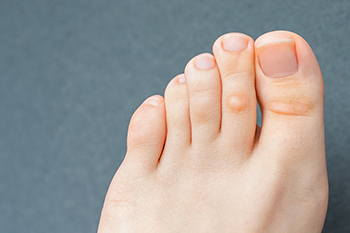
Corns are defined as small, but bothersome, patches of thickened skin, which can quietly disrupt our daily stride. These localized areas of pressure and friction often develop on the feet, particularly over areas that constantly rub against footwear. They are the skin's natural response to protect itself from irritation. However, when left untreated, corns can cause pain and discomfort. Prevention is the key to keeping corns at bay. Choosing shoes that fit well with ample toe room and cushioning can minimize friction. Regularly moisturizing the feet can help to keep skin supple and less prone to developing corns. Wearing orthotic inserts can help to provide proper arch support in addition to distributing pressure evenly. It is beneficial to recognize the importance of preventing corns on the feet, ensuring that each step remains comfortable and pain-free. If you have problematic corns on your feet, it is suggested that you consult with a podiatrist for effective relief options.
If you have any concerns regarding your feet and ankles, contact Dr. Henry Miller of New Jersey. Our doctor will treat your foot and ankle needs.
Corns: What Are They? and How Do You Get Rid of Them?
Corns can be described as areas of the skin that have thickened to the point of becoming painful or irritating. They are often layers and layers of the skin that have become dry and rough, and are normally smaller than calluses.
Ways to Prevent Corns
There are many ways to get rid of painful corns such as wearing:
Treating Corns
Treatment of corns involves removing the dead skin that has built up in the specific area of the foot. Consult with Our doctor to determine the best treatment option for your case of corns.
If you have any questions please feel free to contact our office located in Freehold, NJ . We offer the newest diagnostic and treatment technologies for all your foot and ankle needs.
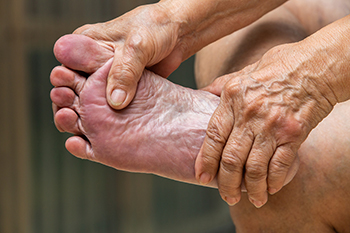
As we gracefully age, caring for our feet becomes an integral aspect of maintaining overall well-being. Elderly foot care is more than just a routine, it is a necessary practice that enhances mobility and quality of life. Regularly inspecting feet for any changes, such as cuts, blisters, or swelling, is a fundamental step. Proper hygiene, including thorough cleaning and drying, can help to prevent infections. Moisturizing keeps the skin supple and minimizes discomfort that is related to dryness. Choosing comfortable and supportive footwear, with cushioning and appropriate arch support, is vital to prevent foot pain. Trimming the toenails with care and seeking professional assistance for any foot concerns ensures comprehensive foot health. By embracing these tips, seniors can stride confidently and comfortably through the years, nurturing their feet as they continue their journey of graceful aging. If you would like additional tips on proper foot care for elderly people, it is suggested that you confer with a podiatrist.
Proper foot care is something many older adults forget to consider. If you have any concerns about your feet and ankles, contact Dr. Henry Miller from New Jersey. Our doctor can provide the care you need to keep you pain-free and on your feet.
The Elderly and Their Feet
As we age we start to notice many changes in our body, but the elder population may not notice them right away. Medical conditions may prevent the elderly to take notice of their foot health right away. Poor vision is a lead contributor to not taking action for the elderly.
Common Conditions
Susceptible Infections
Diabetes and poor circulation can cause general loss of sensitivity over the years, turning a simple cut into a serious issue.
If you have any questions please feel free to contact our office located in Freehold, NJ . We offer the newest diagnostic and treatment technologies for all your foot and ankle needs.
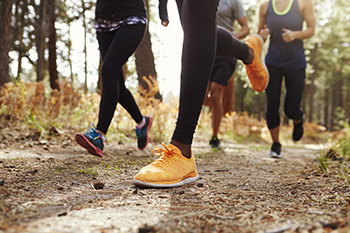
Though running with flat feet can be challenging, it is possible to enjoy pain free runs and improve your athletic performance. Having flat feet can alter alignment of the lower extremities, which may result in strain on soft tissues and joints. Choosing the right shoes with adequate arch support is crucial. Proper running technique and posture are also essential for flat footed runners. A podiatrist can advise on the most suitable foot landing, whether forefoot, midfoot, or heel running, and help you to maintain an proper posture during running. Stretching after each run is recommended for flat footed runners. In addition, it is beneficial to alternate running surfaces, which may help to alleviate strain. Non impact equipment, such as elliptical trainers or stair machines, are other alternatives. If you are experiencing problems that stem from having flat feet while running, it is suggested that you make an appointment with a podiatrist who can offer custom orthotics that may address the issue and contribute to pain free running.
Flatfoot is a condition many people suffer from. If you have flat feet, contact Dr. Henry Miller from New Jersey. Our doctor will treat your foot and ankle needs.
What Are Flat Feet?
Flatfoot is a condition in which the arch of the foot is depressed and the sole of the foot is almost completely in contact with the ground. About 20-30% of the population generally has flat feet because their arches never formed during growth.
Conditions & Problems:
Having flat feet makes it difficult to run or walk because of the stress placed on the ankles.
Alignment – The general alignment of your legs can be disrupted, because the ankles move inward which can cause major discomfort.
Knees – If you have complications with your knees, flat feet can be a contributor to arthritis in that area.
Symptoms
Treatment
If you are experiencing pain and stress on the foot you may weaken the posterior tibial tendon, which runs around the inside of the ankle.
If you have any questions please feel free to contact our office located in Freehold, NJ . We offer the newest diagnostic and treatment technologies for all your foot and ankle needs.
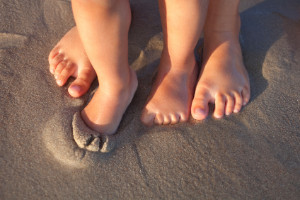
Toddlers' feet grow at an unpredictable rate, just like their ever-changing moods and preferences. Between ages 1 and 3, a child's foot typically grows about 1/2 to 3/4 inches per year, with occasional growth spurts leading to rapid changes in shoe size. Trying to measure their feet monthly can be a challenge, so monitoring how well their shoes fit is the best way to gauge their growth. It is common for toddlers to require two or three different shoe sizes within a year, which may seem costly but is a natural part of their development. After age 3, foot growth slows to about 1/2 inch per year until reaching adult size. When shopping for shoes, it is crucial to check the fit regularly, ensuring there is enough space for the toes. Non-slip soles are essential for toddlers, as they are still developing coordination. Opt for shoes with easy fastening, like hook-and-loop tape, as toddlers are not yet ready to tie laces independently. Parents can support their toddlers' healthy foot development by choosing the right-sized and comfortable shoes during these crucial early years. If you would like more help in understanding your toddlers’ growing feet and proper shoe selection, it is suggested that you make an appointment with a podiatrist.
Making sure that your children maintain good foot health is very important as they grow. If you have any questions, contact Dr. Henry Miller of New Jersey. Our doctor can provide the care you need to keep you pain-free and on your feet.
Keeping Children's Feet Healthy
Having healthy feet during childhood can help prevent medical problems later in life, namely in the back and legs. As children grow, their feet require different types of care. Here are some things to consider...
Although babies do not walk yet, it is still very important to take care of their feet.
Avoid putting tight shoes or socks on his or her feet.
Allow the baby to stretch and kick his or her feet to feel comfortable.
As a toddler, kids are now on the move and begin to develop differently. At this age, toddlers are getting a feel for walking, so don’t be alarmed if your toddler is unsteady or ‘walks funny’.
As your child gets older, it is important to teach them how to take care of their feet.
Show them proper hygiene to prevent infections such as fungus.
Be watchful for any pain or injury.
Have all injuries checked by a doctor as soon as possible.
Comfortable, protective shoes should always be worn, especially at play.
If you have any questions please feel free to contact our office located in Freehold, NJ . We offer the newest diagnostic and treatment technologies for all your foot and ankle needs.
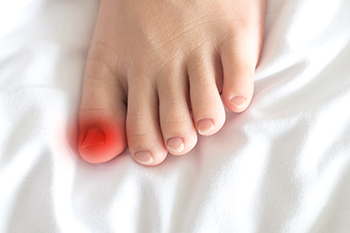
Toenails grow over the skin, and an ingrown toenail occurs when the nail grows into the skin instead of over it. This can be an extremely painful foot condition, and may be caused by genetic reasons, or from wearing shoes that are too tight. It may also happen if a toe injury has occurred, such as stubbing the foot against a piece of furniture. Research has indicated that having poor posture may lead to developing an ingrown toenail. This may cause the toes to push together, and pressure can be exerted on them as they grow. Additionally, a common reason to have an ingrown toenail can be from cutting the toenails incorrectly, or from having poor foot hygiene. If you have an ingrown toenail, it is strongly suggested that you are under the care of a podiatrist who can correct this painful condition, which may include surgery for permanent relief.
Ingrown toenails may initially present themselves as a minor discomfort, but they may progress into an infection in the skin without proper treatment. For more information about ingrown toenails, contact Dr. Henry Miller of New Jersey. Our doctor can provide the care you need to keep you pain-free and on your feet.
Ingrown Toenails
Ingrown toenails are caused when the corner or side of a toenail grows into the soft flesh surrounding it. They often result in redness, swelling, pain, and in some cases, infection. This condition typically affects the big toe and may recur if it is not treated properly.
Causes
You are more likely to develop an ingrown toenail if you are obese, have diabetes, arthritis, or have any fungal infection in your nails. Additionally, people who have foot or toe deformities are at a higher risk of developing an ingrown toenail.
Symptoms
Some symptoms of ingrown toenails are redness, swelling, and pain. In rare cases, there may be a yellowish drainage coming from the nail.
Treatment
Ignoring an ingrown toenail can have serious complications. Infections of the nail border can progress to a deeper soft-tissue infection, which can then turn into a bone infection. You should always speak with your podiatrist if you suspect you have an ingrown toenail, especially if you have diabetes or poor circulation.
If you have any questions, please feel free to contact our office located in Freehold, NJ . We offer the newest diagnostic and treatment technologies for all your foot care needs.